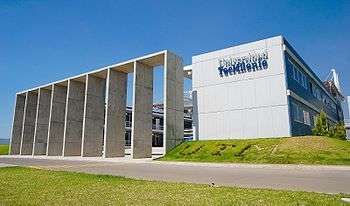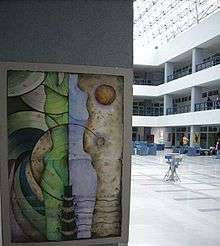TecMilenio University
The Universidad Tecmilenio (UTM) (Tecmilenio University) is a private institution of higher education. The institution is part of Monterrey Institute of Technology and Higher Education[4] Tecmilenio University ITESM System, an educational system with national and international levels, through 30 campus and an online campus with a unique and innovative educational model that forms professionals with the skills needed by modern businesses and organizations. For-profit schools that have entered the country in recent years,[5] the university serves some 21,000 students on its own at high school, undergraduate and postgraduate level, frequently through distance learning. Like most schools it now follows a semester model that replaced the original four-month terms.
Universidad Tecmilenio | |
 Tecmilenio University logo | |
| Type | Private |
|---|---|
| Established | 2002 |
| Rector | Bruno Zepeda [1] |
| Students | 21,000[2] |
| Location | |
| Campus | 40 across Mexico, mostly urban[3] |
| Website | http://www.tecmilenio.mx/en |
Campuses

As of 2009 the university has 40 campuses distributed over several Mexican cities:[3]
Chiapas: Tapachula; Chihuahua: Camargo, Chihuahua, Cuauhtémoc, Cd. Juárez and Parral; Coahuila: Torreón (Laguna); Colima: Colima; Durango: Durango; Jalisco: Guadalajara (Guadalajara, Guadalajara Executive) and Zapopan; Mexico City: Ferrería and Reforma; Michoacán: Morelia; Morelos: Cuautla and Cuernavaca; Nuevo León: Guadalupe, Monterrey (Cumbres, Las Torres), San Nicolás de los Garza and Santa Catarina; Puebla: Puebla; Querétaro: Santiago de Querétaro and San Juan del Río; Quintana Roo: Cancún; San Luis Potosí: San Luis Potosí; Sinaloa: Culiacán, Los Mochis and Mazatlán; Sonora: Guaymas, Hermosillo, Navojoa, Cd. Obregón; State of México: Tecoac, Cuautitlán Izcalli and Toluca; Tabasco: Villahermosa; Tamaulipas: Matamoros and Reynosa; Veracruz: Veracruz; Yucatán: Mérida.
According to John Auters of the Financial Times, most campuses have no extracurricular activities nor sports facilities to lower costs.[5]
Organization
A national rectorate is based in Monterrey, Nuevo León, and oversees eight vice-rectorates:[4]
- Two internal vice-rectorates are in charge of academics and internal affairs.
- Five regional vice-rectorates are in charge of all campuses in the northern, eastern, southern and western areas, as well as in the Monterrey Metropolitan Area.
- A vice-rectorate is specialized in its distance education programs.
As of 2019 the rector is Héctor Mauricio Escamilla Santana, who is being overseen by Salvador Alva, president of Tecnologico de Monterrey.[4]
Programs

Tecmilenio University offers traditional and bilingual careers in areas of health sciences, humanities and social sciences, engineering, business and information technology. The masters cover three areas of study — humanities, business and information technology — and finally there is the continuing education which includes courses, seminars, certifications, among others.
Ranking
According to university ranking 2011 in the journal College Guide from the editors of Reader's Digest Tecmilenio University is in the top nine universities in Mexico.
- Universidad Nacional Autónoma de México 1910
- Instituto Tecnológico y de Estudios Superiores de Monterrey 1943
- Instituto Politécnico Nacional 1936
- Universidad Iberoamericana 1943
- Instituto Tecnológico Autónomo de México 1946
- Universidad Anáhuac 1964
- Universidad Tecmilenio 2002
- Universidad de Guadalajara 1791
- Universidad Autónoma Metropolitana 1973
References
- González, Leonardo (2009-09-08). "Presentan en ceremonia a nuevo Rector de la Universidad Tecmilenio" (in Spanish). Universidad Tecmilenio. Archived from the original on 2009-09-26. Retrieved 2008-06-29.
- CNN Expansion (2007-04-24). "Crece Tec Milenio" (in Spanish). Archived from the original on 2008-04-10. Retrieved 2008-06-29.
- "Nuestros campus" (in Spanish). Universidad Tecmilenio. 2009. Archived from the original on 2009-10-02. Retrieved 2009-10-12.
- "Organigrama" (in Spanish). Universidad Tecmilenio. Archived from the original on 2009-05-16. Retrieved 2009-10-12.
- Authors, John (2005-11-17). "A private interest in raising Mexican grades". Financial Times. Archived from the original on 2011-07-11. Retrieved 2008-06-29.
Mr Rangel Sostmann now wants to take the Tec's "brand" even further, by moving it into new segments of the market, and extend access. Thus, in smaller and poorer cities that do not have the resources to set up their own campus, there is a new brand: TecMilenio. Students at one of these facilities can combine study with work, and have most of their contact with professors via distance learning. There are no extracurricular activities, no sports facilities. However, they use the same materials as students on campus, take the same exams and receive the same qualifications. Critically, they pay less.